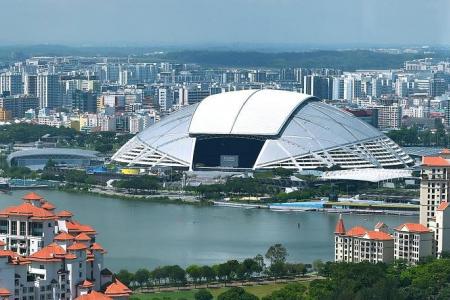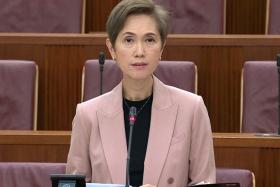Singapore wants successful sporting culture, not solely medals: Eric Chua
The Republic’s goal for its investments in sports here is to broaden access to sports and facilities, while supporting its athletes and para-athletes to maximise their potential.
In doing so, the aim is to rally communities together and foster national pride and cohesion, Senior Parliamentary Secretary for Culture, Community and Youth Eric Chua said on Thursday.
“Our goal is to win – of course. But we must accurately define what ‘winning’ is, while recognising that we cannot compete directly with countries that have large populations,” he said.
‘Winning’ should also not be limited to medals, which are the tip of the iceberg, said Mr Chua. The Government is focused on developing a sport ecosystem that supports athletes across the 8 to 12 years needed to get to peak performance, he added.
This is why Singapore has spent an average of $90 million annually in recent years to build and operate stadiums, pools and other public facilities, Mr Chua said during a five-and-a-half hour debate on Singapore’s sports scene.
Sport Singapore’s Sport Excellence (Spex) Scholarship was in 2022 extended beyond athletes competing in major Games, while since this year scholars are allowed to retain their scholarship while serving their national service.
For athletes in emerging, new and niche sports, the Government is also committed to facilitating access to gym facilities, sport psychologists and competition facilities, he added.
The debate was on a motion that called on the Government to “undertake a thorough evaluation of the areas of improvement in Singapore’s sporting ecosystem”. Filed by Workers’ Party MPs Jamus Lim (Sengkang GRC) and Faisal Manap (Aljunied GRC), it also celebrated the accomplishments of Team Singapore athletes in recent international competitions.
Citing studies that showed most countries do better in sports as they became wealthier, Prof Lim said Singapore has “not only punched way below our weight, but has actually gotten consistently worse”.
“We do not only appear to systematically under-invest in sport, we also appear to under-achieve relative to how much we put in,” he said. “Hence, the issue is how much more effective can we be with the monies we devote currently already to sport?”
Mr Faisal pointed to the Young Lions’ disastrous group-stage exit at the SEA Games, and called for the Football Association of Singapore (FAS) to engage in a national conversation that includes local fans. FAS is expected to make public a review of the team’s recent performance on Friday.
All of WP’s MPs, with the exception of Mr Louis Chia, spoke on various topics, including football, supporting lesser-known sports, diversity, inclusivity, mental health and post-retirement support.
Leader of the Opposition Pritam Singh said the non-selection by the Singapore National Olympic Council of long-distance runner Soh Rui Yong for the upcoming Asian Games made the sporting body look petty in the eyes of the public.
The runner had been left off the team for failing to honour commitments made to the SNOC and continuing to make “disparaging and derisive remarks”. Mr Singh said authorities should “intercede to prevent the parties from reaching a point where Singapore sport cuts off its nose to spite its face”.
Responding to Mr Singh, Nominated MP Mark Chay said Mr Soh was shown leniency after he agreed to abide by the code of conduct for athletes and not make disparaging comments, but “took advantage of the situation (and) broke his commitment” to the SNOC.
“If Rui Yong is truly sorry...and wants to be a great ambassador for sports, the door is probably not closed,” said Mr Chay, who is also president of the Singapore Swimming Association.
In an exchange with WP’s Prof Lim, Mr Chay said it takes time for athletes to reach high performance, citing the eight-year gap between celebrated swimmer Ang Peng Siong’s gold medal win in the 1993 SEA Games to the next time when the Singapore men’s swim team next won a gold medal in that competition.
This is even more so for team sports, which are extremely complex compared to individual sports, he added.
This drew a response from Prof Lim for what “amounted to an apology for our relative underperformance”.
In his speech, Mr Chua called on Singaporeans to rally behind its athletes whether they win or lose. He said the power of sport is in its ability to unite people, but only if there is support for athletes regardless of outcome.
At the sitting, Mr Darryl David (Ang Mo Kio GRC) proposed three amendments to WP’s motion. These included changing the wording to call on the Government “to continue its thorough evaluation of the areas of improvement in Singapore’s sporting ecosystem”.
Parliament voted to pass the amended motion, with WP MPs and Non-Constituency MP Leong Mun Wai registering their dissent.
Get The New Paper on your phone with the free TNP app. Download from the Apple App Store or Google Play Store now


